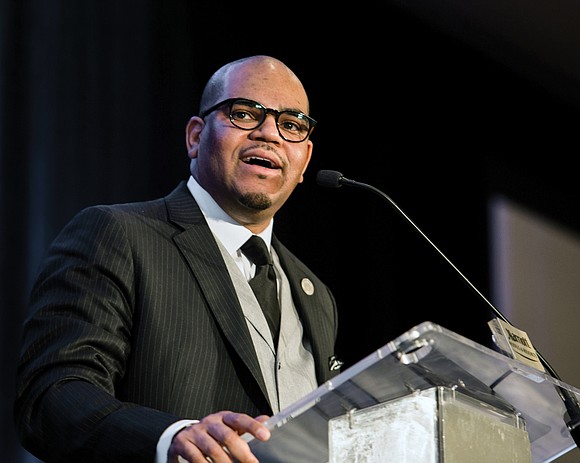City Council empanels Coliseum commission -- with VUU president
9/27/2019, 6 a.m.
The final seven members of a City Council commission to review the $1.5 billion Coliseum replacement proposal have been seated — starting a 90-day clock for them to review the plan.
A divided governing body voted 5-4 Monday night to include Virginia Union University President Hakim J. Lucas on the commission, handing a victory to Mayor Levar M. Stoney and other supporters of the project.
Dr. Lucas is a publicly declared advocate of the Downtown project, despite City Council’s initial desire to empanel an impartial commission.
Dr. Lucas signed his name to an opinion piece published in December in Richmond’s daily newspaper praising the massive development plan that calls for private development of apartments, offices and retail shops near City Hall to accompany construction of a new, larger $225 million Coliseum for which taxpayers would foot the bill.
Before the vote, Dr. Lucas sent a letter to City Council members, assuring them he could put aside his bias and fairly review the project with the other members of the commission.
The vote for Dr. Lucas and the other new members came on a night when the council also essentially granted the administration permission to again use the Annie Giles Community Resource Center across from the Richmond Justice Center as the cold-weather overflow shelter for the homeless. But the council moved to limit the use of the Giles Center as a homeless center only for the coming winter and to block the mayor’s request to make it permanent.
The council also voted to name Haskell C. Brown III as interim city attorney to take over City Hall’s legal office on Nov. 1, following the retirement of Allen L. Jackson.
Councilman Michael J. Jones, 9th District, who led the support for Dr. Lucas, made skin color the sole test.
He argued that the three African-Americans previously proposed for the commission were not enough and supported Dr. Lucas.
Councilman Chris A. Hilbert, 3rd District, cast the decisive vote for Dr. Lucas, who holds a MBA and has spent much of his career raising money for the colleges and universities where he has worked.
Mr. Hilbert said that VUU too often is excluded from participating in city decisions. He said Dr. Lucas’ appointment would cure that, although there is no document or other evidence in the proposal indicating that VUU would benefit from the redevelopment project.
That claim was quickly undermined by council’s decision to include on the commission Dr. Corey D. B. Booker, the former dean of VUU’s seminary who currently is a professor at the University of Richmond.
Others voting for Dr. Lucas’ appointment were Council President Cynthia I. Newbille, 7th District; Andreas D. Addison, 1st District; and Ellen F. Robertson, 6th District.
Opposing Dr. Lucas’ appointment were Council members Kim B. Gray, 2nd District; Kristen N. Larson, 4th District; Parker C. Agelasto, 5th District; and Reva M. Trammell, 8th District.
Seating Dr. Lucas required the removal of Richard Crom, a program and management analyst for the Internal Revenue Service, from the original proposed slate.
As now constituted, the commission members include former state Secretary of Transportation Pierce Homer, entertainment business consultant John Gerner, former Richmond hospital executive Mark Gordon, deputy state Secretary of Administration Grindly Johnson, development attorney Suzanne Long, architect Mary Sadler and attorney and business executive Michael Schewel.
However, the council has yet to hire an independent consultant to review the project despite voting to set aside $190,000 from the council’s budget for that purpose.
The commission was seated even as the council continues its own education on the project with a series of nine, four-hour meetings extending into December to receive briefings on Navy Hill.
The first session, held earlier Monday before the council meeting, started a half-hour late and ultimately drew only five members, according to Ms. Gray.
Mr. Hilbert, one of those who missed the briefing, said his work schedule would never allow him to attend.
During the informal council session ahead of the regular meeting, Ms. Gray raised concern that the session tied up two dozen city directors, council staff and other city employees, taking them away from their primary city work.
Mr. Agelasto, who arrived after 1 p.m. only to find the briefing session had ended, questioned the need to tie up staff to brief the council and also then testify before the commission. “It’s an unneeded redundancy,” he said.
However, Dr. Newbille said that given the size and potential impact of the project, “the more redundancy the better.” She said that council needs to be as conversant as possible with the details and also needs to hear from a variety of voices, including the commission and the public, to make an informed decision.





